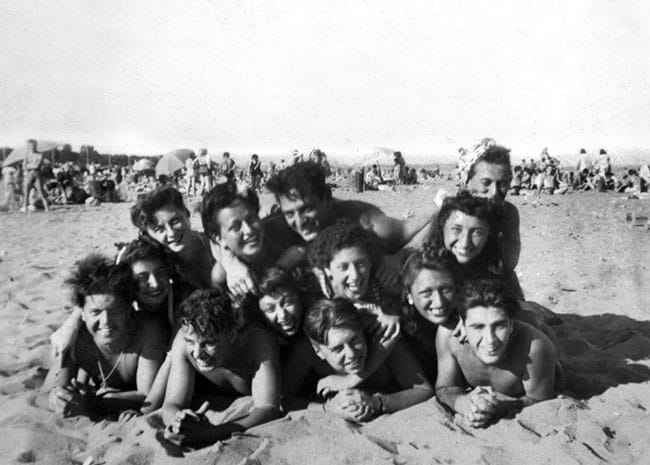Allison Strouse, W’07, has already personally benefited from her startup, and if nothing more comes of her entrepreneurial pursuit, she got to know her grandmother better. Her grandmother suffered from Alzheimer’s disease for most of Strouse’s life. Using the service created by Strouse’s startup, Yarly, her uncle was able to digitize, preserve and share photos of her grandmother.
“Through these photos, I saw a side of her that brought her youth and energy back to life. Whether doing a silly pose with her friends on the beach (above) or a proper photo at her boarding school in Austria (below), I got a sense of her beauty, kindness and friendships. I feel more blessed than ever to be her granddaughter, and I hope that I carry some her wonderful traits within me,” Strouse told me.
Strouse realizes that every family has their “most precious memories” captured in photos, yet they are stored in shoe boxes, under beds and otherwise in places that may not be safe or easy to get to.
“Nothing is more precious than those photos in our attic,” she said.
The impetus behind the startup, however, was a fun friends’ weekend in San Francisco, where Strouse was working in the tech industry in the spring 2012. Penn friend Rachel Horowitz, C ’07, came to town, and between the two of them, they took an album’s worth of photos. When Strouse looked to collect and share these, she couldn’t find a solution that wasn’t too social or too technologically antiquated. By November 2012, a solution clicked: she incorporated a business to create a private photo sharing app.
The pivot came in 2014—when Strouse found a way to preserve existing print photos with the help of a Tupperware party-type business model. Strouse saw the power of the model firsthand March 1, 2014, when she hosted the first “Yarly party” in New Jersey. She estimated that she and her team scanned 13,000 photos that day. Participants gushed to her that they would pay anything for such a service. If that didn’t set off the flash in her head, Strouse started to get a sense for the emotional pull of what she was doing when she was featured on Fox Business in June 2014. The following month, Yarly began recruiting local partners—so far in Oregon, Missouri, Indiana and New York—who can hold scanning events in their neighborhoods. Interested consumers come with photos in hand, watch them be scanned, and leave with digitized versions stored in perpetuity and accessible by a mobile app and online. Costs are per-photo, and partners keep 40 percent of all revenue.
Watch Allison Strouse’s “Elevator Pitch” on Fox Business.
The service combines convenience, technology and safety. Yarly’s main competition, Strouse says, typically involves shipping photos by mail to far-off processing locations. These companies actively market their services, which are key to making the customer “act now”, but this comes at a high customer acquisition cost. According to Strouse, nothing is more powerful than word-of-mouth marketing, particularly with their target demographic, Gen X and Baby Boomers
“Our team of local partners is more effective than any online ad or even flash sale could be. We make getting your photos scanned incredibly convenient and fun,” says Strouse, adding that the experience builds brand loyalty and trust.
Strouse may also have timing on her side. Strouse cited one estimate of 500 billion photographic prints in the U.S. alone—all slowly fading and rotting. What’s more, Creative Memories, a company that organized parties around scrapbooking, shut down in the summer 2014, setting adrift 70,000 local “consultants.” Located around the United States, these individuals provide ready-made Yarly partners. Strouse adds, however, that Yarly is choosy when selecting and training new partners—and already has a pipeline of interested people in the U.S., as well as in Canada and the U.K.
“We are empowering entrepreneurship around the world,” she said.
To empower her own entrepreneurship, Strouse has invested a “good chunk” of her own savings. Three founding developers, who came on board in mid-2013, have devoted themselves to the project, and outside investors have supported Yarly as well. Friends and family, sure. Most impressively, though, Yarly was one of five student ventures (out of 23) to get seed capital investment from Columbia Business School’s Eugene M. Lang Entrepreneurial Initiative Fund in 2014. (Strouse is a ’14 graduate.) The firm is currently in the fundraising process with its sights on ramping up and servicing its partner base.

























